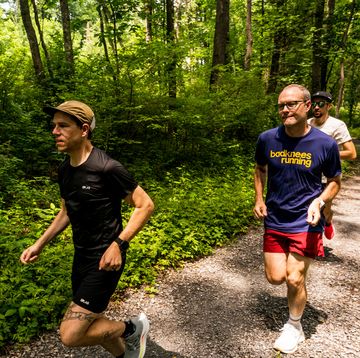Running is hard. If you're targeting a goal—whether it's entering your first race or qualifying for Boston—you spend a lot of time pushing your limits. So when it comes time to run easy, you happily succumb to your inner plodder, right? Nope. "Not running slow enough on easy days is probably the number-one error runners make," says Greg McMillan, M.S., an exercise physiologist and running coach in Flagstaff, Arizona.
Consciously or not, many runners push too hard on easy runs and miss out on their varied benefits—like time to heal, for one. Demanding workouts like speedwork and long runs put a great deal of stress on muscles, and "any time there's a stress, you have to allow some recovery time for those tissues to rebuild," McMillan says. Time spent going easy also builds your fitness base and staves off burnout. "Easy runs allow you to focus on enjoying the run and your surroundings," says Michael Sachs, Ph.D., a sports psychologist at Temple University.
Follow these simple rules to properly chill out before your next big workout.
CA Notice at Collection
IT'S EASY: Seventy percent of your weekly mileage should be easy miles. Depending on your age and fitness level, your muscles need 30 to 60 hours to recover from a hard effort, says McMillan. (Long, slow runs lasting 1.5 to 2.5 times longer than your average weekday run count as hard efforts due to their duration.) Running super slow and relaxed for one to three days after tough workouts gets blood flowing to muscles, which flushes away broken-down proteins, delivers new proteins to rebuild damaged tissue, and carries carbohydrates to replenish depleted stores in muscle cells. "That gentle exercise bathes muscles in the good stuff they need and removes all the bad stuff caused by the prior training," McMillan says. "And running as part of your recovery makes your body say, 'Oh, I'm still getting this stress—I better build this tissue even stronger.'"
RULE #2: HEED YOUR WATCH—OR LISTEN TO YOUR BODY
IT'S EASY: If you're notoriously bad at going slow enough, plug your easy-run pace into your watch and abide by the beep—at least until you firmly establish how slow should feel. If you're Races - Places
All About 75 Hard
IT'S EASY: For those who get bored or frustrated with lumbering along, you might wonder why you can't just skip easy runs and do something else—like rest or cross-train. It's simple, really. "The more you run, the better you'll be," says McMillan. "That's why most runners run as much as they can." Easy runs build your fitness base. They condition your musculoskeletal system to adapt to stress, which allows your body to handle greater mileage, and they help your cardiovascular and respiratory systems become more efficient. "You grow more of the capillary beds that deliver oxygen," says McMillan, "and stimulate more of the mitochondria that produce energy within muscle cells." So if you're serious about improving as a runner, run consistently—unless you're injury-prone, says Mike Hamberger, M.A., a coach in Washington, D.C. For the often injured, he says, "recovery jogs can become stressful workouts, not because they're doing the wrong pace, but because every time they run they're causing excessive stress on the body." Such runners should mimic running on easy days, through aqua-jogging or running-specific strength training.
RUN better: You're going slow enough if you're breathing at a 3:3 ratio—running three steps while breathing in, running three steps while breathing out.
All About 75 Hard!
Resist the urge to speed up your easy runs with these tips from sports psychologist Michael Sachs, Ph.D.
THE EXCUSE: Advertisement - Continue Reading Below!
THE SOLUTION: Engage your brain. Listen to music, a podcast or audio book, or make a point of noticing new details along old routes.
THE EXCUSE: Other Hearst Subscriptions!
THE SOLUTION: Get over it. "You're running for yourself, not for other people," Sachs says. If you still can't bear it, change your route.
THE EXCUSE: Shoes & Gear.
THE SOLUTION: Overcome your competitive drive by hitting the treadmill. Or focus on running your own pace no matter what—good practice for race day.
21% OF RESPONDENTS REPORT THEY HAVE NO PROBLEM GOING SLOW ENOUGH ON EASY-RUN DAYS, ACCORDING TO AN RW POLL.












